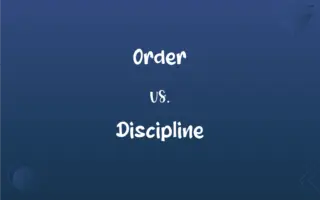Political Science vs. Economics: What's the Difference?
Edited by Aimie Carlson || By Janet White || Published on February 22, 2024
Political science studies government systems, political behavior, and political processes; economics focuses on the production, distribution, and consumption of goods and services.

Key Differences
Political Science primarily deals with the theory and practice of politics and the analysis of political systems, political activities, political thoughts, and political behavior. It explores the structures of government and the analysis of political activity and political entities. Economics, in contrast, is the social science that studies the production, distribution, and consumption of goods and services. It focuses on how individuals, businesses, governments, and nations make choices on allocating resources to satisfy their needs and wants.
Political Science examines the role and function of government, including how laws are made, the impact of policies, and the interaction of political entities within and among nations. It often involves qualitative analyses of political systems, ideologies, political movements, and public administration. Economics, on the other hand, involves quantitative analyses, utilizing models and theories to understand how economies function. It studies market behavior, economic theories, and the application of economic principles to policy and decision-making.
The scope of Political Science includes understanding different government systems (like democracies, autocracies), electoral processes, political parties, and international relations. It also delves into the study of political philosophy and ethics. Economics, meanwhile, delves into microeconomics (studying individual and business decisions) and macroeconomics (studying the economy as a whole), focusing on economic growth, inflation, unemployment, and government fiscal and monetary policy.
In Political Science, the focus is often on understanding power dynamics, governance structures, policy development, and the impact of political decisions on society. It analyzes how political power is distributed and exercised and explores the relationship between governments and their citizens. In Economics, the focus is on understanding how resources are allocated, markets function, and economic policies impact society. It includes studying economic systems, market equilibrium, supply and demand, and the impact of economic policies on societal well-being.
The methodologies used in Political Science often include qualitative approaches such as historical analysis, case studies, and political theory, along with quantitative methods like statistical analysis and surveys. Economics predominantly uses quantitative methods, including mathematical modeling and econometrics, to analyze economic data and test economic theories.
ADVERTISEMENT
Comparison Chart
Focus
Government systems, political behavior, policy analysis
Production, distribution, consumption of goods
Analytical Approach
Qualitative and quantitative, political theory
Quantitative, economic modeling
Key Study Areas
Government structures, power dynamics, international relations
Microeconomics, macroeconomics, market behavior
Primary Concerns
Power distribution, policy impact, governance
Resource allocation, economic policies
Methodologies
Historical analysis, case studies, surveys
Mathematical models, econometrics
ADVERTISEMENT
Political Science and Economics Definitions
Political Science
The study of politics, government systems, and political behavior.
She chose to major in political science to better understand electoral systems.
Economics
The social science studying production, distribution, and consumption of goods and services.
He studied economics to understand how markets operate.
Political Science
Examination of political activity and political entities.
Political science helps us understand the role of political parties in a democracy.
Economics
The study of how individuals and societies allocate resources.
Economics examines both individual consumer behavior and national economic policies.
Political Science
The study of public policy and the impact of government decisions.
In her political science class, she learned about the policy-making process.
Economics
Examination of the factors that influence economic growth and stability.
Her thesis in economics focused on factors contributing to economic recessions.
Political Science
The academic discipline concerning theories of governance and power.
Political science often explores the balance of power between different branches of government.
Economics
Analysis of how societies use scarce resources.
In economics, she learned about the importance of supply and demand.
Political Science
Analysis of political structures and processes.
His research in political science focuses on the effectiveness of democratic institutions.
Economics
Investigation of market systems, economic theories, and fiscal policies.
His interest in economics led him to research monetary policy.
Economics
(used with a sing. verb) The social science that deals with the production, distribution, and consumption of goods and services and with the theory and management of economies or economic systems.
FAQs
How do political science and economics intersect?
They intersect in areas like public policy, where government decisions impact economic systems.
What is political science?
Political science is the study of politics, government systems, and political behavior.
What methodologies are used in political science?
Political science uses both qualitative and quantitative methods, including case studies and statistical analysis.
Can political science theories be applied to economics?
Yes, understanding power dynamics in political science can inform economic policy decisions.
What role does resource allocation play in economics?
It's central to understanding how economies function and how decisions are made in markets.
Are political science and economics interdependent?
Yes, political decisions often have economic impacts, and economic conditions can influence political policies.
How does political science contribute to understanding governments?
It analyzes government structures, electoral processes, and power relations.
How do economic theories impact real-world policies?
Economic theories guide policy-making, especially in fiscal and monetary matters.
What does economics study?
Economics studies the production, distribution, and consumption of goods and services.
What are the key focus areas of economics?
Economics focuses on microeconomics, macroeconomics, and market behavior.
Does political science involve international relations?
Yes, it extensively covers international politics and relations between countries.
What is the focus of microeconomics?
Microeconomics focuses on individual and business decision-making processes.
How does political instability affect economies?
Political instability can lead to economic uncertainty, affecting investment and growth.
Can a political science background benefit economists?
Yes, understanding political environments helps economists predict policy impacts.
Are political science studies limited to democracies?
No, it studies all forms of government, including autocracies and oligarchies.
What is the importance of studying economics?
Studying economics is crucial for understanding market dynamics and informing sound fiscal policies.
What is the significance of political theory in political science?
Political theory helps in understanding the philosophical foundations of political systems.
Can political science predict election outcomes?
It can analyze trends and factors influencing elections but cannot always predict outcomes.
How does economics interact with other social sciences?
Economics intersects with disciplines like sociology and psychology in understanding consumer behavior.
What is the role of government in economics?
Governments play a key role in economic regulation, policy-making, and maintaining economic stability.
About Author
Written by
Janet WhiteJanet White has been an esteemed writer and blogger for Difference Wiki. Holding a Master's degree in Science and Medical Journalism from the prestigious Boston University, she has consistently demonstrated her expertise and passion for her field. When she's not immersed in her work, Janet relishes her time exercising, delving into a good book, and cherishing moments with friends and family.
Edited by
Aimie CarlsonAimie Carlson, holding a master's degree in English literature, is a fervent English language enthusiast. She lends her writing talents to Difference Wiki, a prominent website that specializes in comparisons, offering readers insightful analyses that both captivate and inform.






































































